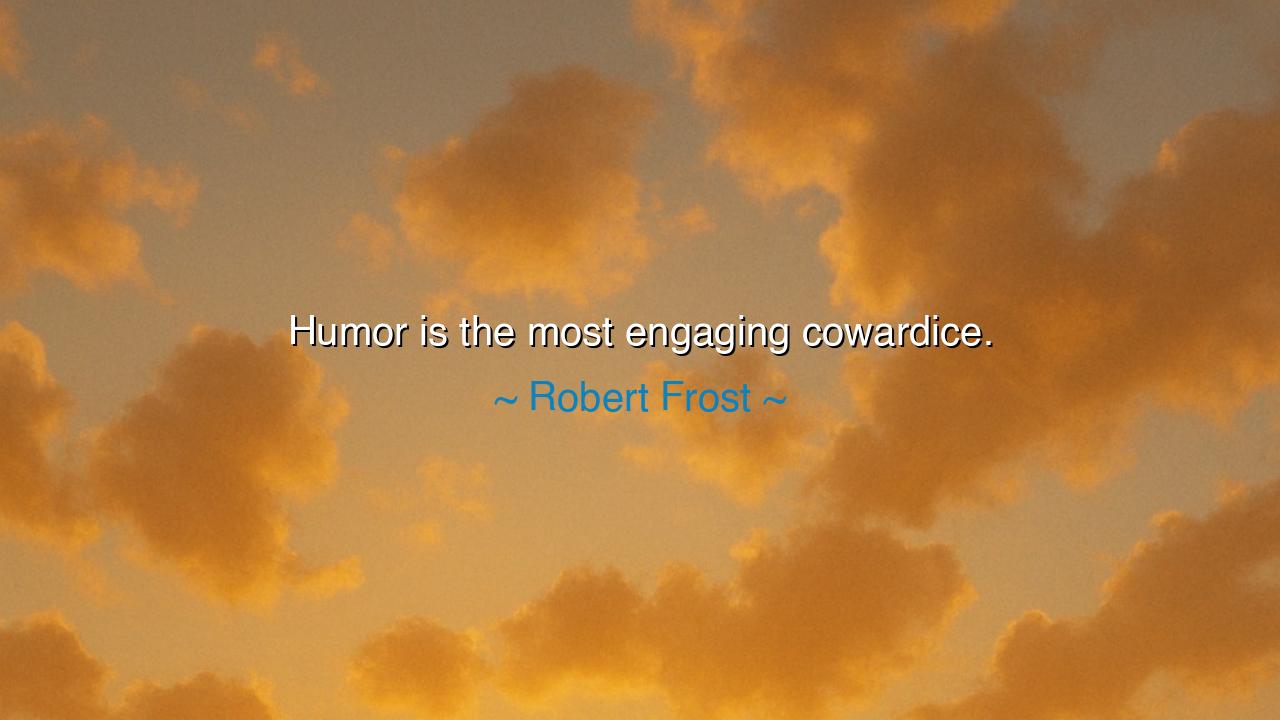
Humor is the most engaging cowardice.






The poet Robert Frost, whose words often unveiled the subtle ironies of human nature, once said: “Humor is the most engaging cowardice.” In this brief yet piercing line, Frost captures the dual nature of humor — its charm and its escape, its courage and its evasion. He reminds us that laughter, though often delightful, can also serve as a shield — a way to hide one’s wounds while still appearing fearless. To call it “cowardice” is not to condemn it, but to acknowledge that even in jest, humanity conceals the tremor of its soul. Frost saw humor as the most graceful form of retreat, the smiling mask worn by those too wise to battle pain directly.
Robert Frost lived through a life both luminous and heavy — marked by literary triumphs and personal tragedy. He knew suffering intimately, yet he seldom allowed sorrow to dominate his verse. His humor, gentle and wry, became his way of confronting life’s cruelty without yielding to despair. In calling humor “engaging cowardice,” he reveals his understanding that laughter is the art of retreat without surrender. The cowardice lies in avoiding pain; the engagement lies in transforming it into beauty. Humor, in Frost’s eyes, is not weakness, but a noble compromise between the need to survive and the desire to feel.
The ancients, too, knew this paradox. The Greek philosopher Aristophanes, through comedy, criticized his society more sharply than any politician could. He mocked power, injustice, and human folly — not because he was unafraid, but because laughter made the truth bearable. His humor was his weapon and his refuge, the delicate line between courage and fear. So too with Frost — his words reveal that laughter is often the language of those who feel deeply but choose expression over despair. The cowardice in humor is its refusal to face grief head-on, yet its engagement lies in refusing silence.
Consider also the example of Abraham Lincoln, who during the American Civil War, carried the unbearable weight of a divided nation. His humor was famous — dry, sometimes self-deprecating — but behind it lay sleepless nights and unspoken anguish. When an advisor once scolded him for joking too much, Lincoln replied, “If I did not laugh, I should die.” This is Frost’s truth made flesh: humor as survival, laughter as the soft armor that keeps the heart intact in times of devastation. Lincoln’s wit was not denial — it was endurance in disguise.
And so, when Frost calls humor “cowardice,” he does not mean it as an insult, but as a confession of humanity. We laugh, not because life is always funny, but because it is too tragic to face without laughter. The humorist does not fight pain directly; instead, he dances around it, diffusing its sting with irony and warmth. It is the most engaging cowardice precisely because it invites others to share in that dance. It connects souls in a shared understanding: that beneath the jest, there lies sorrow — and beneath the sorrow, unyielding strength.
Yet Frost’s insight is also a gentle warning. Humor, though healing, must not become a permanent mask. The one who forever hides behind laughter may forget how to weep — and in forgetting, lose a part of their humanity. True wisdom lies in balance: to laugh at the absurdity of life, but not to let laughter replace truth. The bravest heart knows when to smile through pain, and when to face it bare. Humor may protect us, but it cannot redeem us unless we use it to illuminate what hurts.
So, my listener, take this teaching into your days: cherish your humor, for it will soften life’s blows, but do not let it dull your soul. Laugh not to escape, but to endure. Let your wit be compassionate, not cruel; your laughter, an act of strength, not denial. For as Robert Frost reminds us, humor is indeed a kind of cowardice — but it is the most beautiful kind, the kind that allows the wounded spirit to keep walking, still smiling, still human, even in the face of the storm.






AAdministratorAdministrator
Welcome, honored guests. Please leave a comment, we will respond soon